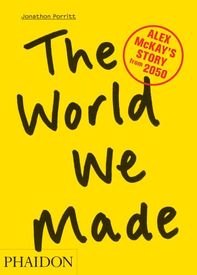
Jonathon Porritt's latest book 'The World we Made' takes on this challenge. The seasoned environmentalist and founder of Forum for the Future writes from the perspective of Alex McKay, a teacher in 2050 looking back on recent decades and reflecting on the changes he has seen. With the help of a research team of students, he describes the social, technological, ecological and financial events and trends that shape the years 2020-50. The world in 2050 is by no means one without problems, but it is by and large more stable and more content.
Porritt uses an entertaining mix of sketches, photos and mocked up covers of magazines from the future to paint his picture. The result is an accessible 'future-history' book (if that wasn't already a word, I've just invented it.)
Alex McKay's reality is quite different from our own, and it is far from being a utopia. There is still a gap between the rich and the poor, for example, but it is not as yawning as it once was. Empathy is far more central to society and competition co-exists with collaboration. As I suspect Porritt intends, you are left feeling heartened and excited by some developments (Malaria is beaten! Coral reefs recover! 90% renewable power!) and decidedly uncomfortable, nay freaked out by others. He describes how governments still haven't really got a handle on regulating biotech, and the threat of cyber-terrorism looms large. Personal genome sequencing is the norm leading to huge advances in preventative healthcare, but ethical concerns relating to brain enhancing 'implants' divide opinion. Personal 'home' robots, with processing power far superior to our own brains look after the elderly and provide companionship. The debate rages over what constitutes a human.
There are deft, heart-warming little touches too- we learn that Detroit, once an industrial powerhouse and centre of the US car industry, sank first to industrial wasteland, then emerged gradually as a shining example of urban farming used as a case study worldwide. In fact, it seems we're now so good at urban food-growing- using everything from traditional allotments to vertical farms, that 40% of our food comes from our cities.
There is an attempt to describe how the international community finally got its act together on reducing carbon emissions, and you may not be surprised to learn that China leads, followed somewhat tardily by the US. I won't spoil the rest for you- but suffice to say coal is consigned to the history books and wind, solar and in the interim, natural gas play a huge part.
Alex McKay's research students are part of the generation still clearing up after their grandparents' excesses, but it is their parents who first begin to put civil pressure on governments. The book describes pivotal, and peaceful popular uprisings calling for a fairer and more sustainable world- the 'Enough!' demonstrations of 2018 and the intergenerational justice movement led by school children in the late 2020s. These events, Alex recalls, were pivotal moments. I read this section as the People's Climate March set off in New York and around the world. As the Guardian's Jo Confino observed, this was the first time socialists have marched alongside big business heads, alongside NGOs and ordinary citizens. It made me think that Alex McKay's experience of popular movements creating real change may not be so far off.
I suspect that some readers may be disappointed not to find more detail on technological solutions, but I don't think that's the purpose of this book. In any case, if you are hungry for more, there is a helpful bibliography at the back pointing to further resources. For me, it served as an accessible and thought-provoking window on a possible future- you may not find all the scenarios plausible, but it's a great way to prompt your own thinking and kick-start your imagination.
Overall, the tone is upbeat- and goodness knows we need more of that- 'a world that works for the majority of people, if we play our cards right.' I'd love to see this book used in schools as in inspiring textbook. And I can certainly see 'The World We Made' making excellent fodder for vision and future planning workshops- whatever sector you work in.
by Jenny Ekelund
| | |

 RSS Feed
RSS Feed